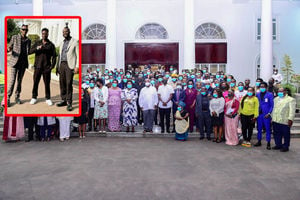Prime
Global citizenship, energy and EACOP

Edward Ssenteza. PHOTO/COURTESY
What you need to know:
- Africans are already disproportionately experiencing the negative effects of climate change, including water stress, reduced food production, increased frequency of extreme weather events, and lower economic growth.
While national citizenship is an accident of birth, global citizenship is a choice. It is the association with a concept that signifies a way of thinking and living within multiple cross-cutting communities.
This means that while we must maintain a healthy sense of patriotism, we must realise that this world is changing fundamentally and that the problems we have cannot be solved by one nation alone. National interests and what is global interest to tackle poverty, insecurity, and climate change must align in the long run. The opportunity costs of the lack of access to modern energy are numerous and include poor agricultural yields and incomes, poor health and educational outcomes, and missed life and business opportunities.
For us, these are the short-term prices we must pay in tackling climate change.
Africa is already facing more severe climate change than most other parts of the world, despite bearing the least responsibility for the problem. With nearly one-fifth of the world’s population today, Africa accounts for less than 3 percent of the world’s energy-related carbon dioxide emissions to date and has the lowest emissions per capita of any region.
Africans are already disproportionately experiencing the negative effects of climate change, including water stress, reduced food production, increased frequency of extreme weather events, and lower economic growth.
The dilemma, therefore, is solving the immediate problem of energy insecurity at the expense of the future risk of climate change.
Uganda is trying to solve its apparent energy security problem by exploring its newly discovered oil, building a refinery, and a crude oil pipeline through Tanzania, among others. As expected, this has faced criticism mostly from already developed and energy-secured Western nations. Uganda is lagging in inclusive growth, partly because of the dualistic nature of its economy, where so much activity and employment in the informal sector is casual and poorly paid.
For structural transformation to succeed, the traditional agricultural and informal urban sectors need significant technological and institutional upgrades. Energy infrastructure is a key enabler of structural transformation and inclusive growth.
Can the country build these critical infrastructures while maintaining global ethics? Will the future price of climate change prove too high compared to the immediate price that is poverty and energy insecurity?
Production of oil and gas remains important to Uganda’s economic and social development, but the focus will have to shift inwards towards domestic demand. Global efforts to accelerate the clean energy transition risks dwindling export revenues for Africa’s oil and gas.
Between now and 2030, Africa’s domestic demand for both oil and gas will account for around two-thirds of the continent’s production.
This puts greater emphasis on developing well-functioning infrastructure within Africa, such as storage and distribution infrastructure such as the East African Crude Oil Pipeline (EACOP), to meet domestic demand for transport fuels and LPG.
In parallel, African countries must focus on strengthening energy efficiency policies and expanding renewables and other clean energy technologies. For an ethical global society to be achieved, it’s important that every nation feels the sense that they can or are on course to achieve their full potential.
We are the first generation in a unique position that can combine the power of global ethics and the ability to communicate and organise globally coupled with the nature of the challenges such as climate change, pandemics, and financial crises which are all global in nature.
The great project of our time is building inclusive institutions that provide a framework for equitable and balanced handling of these challenges.
Edward Ssenteza




